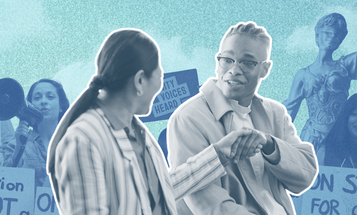
United States v. Vaello-Madero: Economic Justice, Political Equality, and Racial Equity for Puerto Rico
Tomorrow the United States Supreme Court hears oral arguments in a case that has great relevance for our efforts to build an inclusive, multiracial democracy.

Background
Two lower courts ruled that the U.S. government’s exclusion of people in Puerto Rico from SSI benefits violates the equal-protection component of the Fifth Amendment’s guarantee of due process.
In United States v. Vaello-Madero, the Supreme Court will consider whether the U.S. government’s denial of monthly financial assistance to certain low-income residents of Puerto Rico violates the Constitution. Jose Luis Vaello-Madero, a Puerto Rican-born American citizen, brought the case after the government denied his access to Supplemental Security Income (SSI) when he moved back to Puerto Rico — despite the fact that he’d been eligible for benefits while he lived in New York. Two lower courts—the district court and the circuit court—ruled in Mr. Vaello-Madero’s favor, finding that the U.S. government’s exclusion of people in Puerto Rico from SSI benefits violates the equal-protection component of the Fifth Amendment’s guarantee of due process.
Why U.S. v Vaello-Madero Matters for both our Economy and our Democracy
Congress created the SSI program in 1972 to provide cash benefits to low-income people who are elderly and/or live with disabilities. SSI benefits are often a lifeline for people who have limited or no ability to work and no other means to generate income. While the residents of all 50 states, Washington D.C., and the Northern Mariana Islands enjoy SSI benefits, residents of the Puerto Rico and 3 other U.S. territories—the vast majority of whom are people of color—do not.
Demos has long challenged economic policies that flow from political disfranchisement and perpetuate racial discrimination. The exclusion of most residents of the territories from SSI benefits illustrates this intersection clearly. As such, we joined an amicus brief filed in support of Mr. Vaello-Madero, which calls for an end to the discriminatory exclusion of the people of Puerto Rico and other territories from SSI benefits.
The most fundamental principle in a democracy is the people’s ability to self-govern.
While ostensibly a question of economic justice, this case also presents an important question for those of us who are fighting for an inclusive democracy. The most fundamental principle in a democracy is the people’s ability to self-govern. In the case of our representative democracy, that means we have the power to elect leaders who will govern in our interests and to vote out those who do not. Yet the Vaello-Madero case lays bare the severe limitations on that principle in practice for the people of the territories.
The people of Puerto Rico, Guam, the U.S. Virgin Islands, American Samoa, and the Northern Mariana Islands could not vote for (or against) the members of Congress who passed a bill creating an SSI benefits program that excludes most of them, nor could they elect President Nixon, who signed it. To date, with no voting representation in Congress and no meaningful vote for president, they are subject to the edicts of a federal government in which they have no say.
How the Constitution Fosters Colonization
As with many racial inequities in our country, the authority for this discriminatory exclusion can be traced to our Constitution.
This mismatch between the promise and reality of our democracy should come as no surprise. Our democracy has never lived up to the ideals it proudly and loudly espouses. The exclusion of Black and brown people from political and economic opportunity is as much a hallmark of our democracy as are the cries of “liberty and justice for all.” The collective 500+ years of political disenfranchisement, economic exclusion, and racial injustice to which the people of the territories have been subject1 is among the most unmistakable and urgent examples of this truth about American democracy.
As with many racial inequities in our country, the authority for this discriminatory exclusion can be traced to our Constitution. The “territorial clause” of the U.S. Constitution has long been used as cover to impose the U.S. government’s will on the people of the territories, including to deny them rights and benefits many people living in the 50 states enjoy. Above all, it has been used as justification for the ongoing colonization of roughly 3.5 million people, and to thwart their ability to self-govern.2
The Case for Self-Determination
Ending the ongoing colonization of the U.S. territories, and allowing each territory to determine how it wants to constitute itself moving forward, are absolutely key to true democracy.
Colonization has always been a desperate attempt to exert white supremacy, and the continued denial of full democracy to the people of the territories is among its last, dying gasps. The people of each of these places have called for a reckoning with this racist distortion of our democratic principles, ideally in the form of a process of decolonization and self-determination of each jurisdiction’s political status. Ending the ongoing colonization of the U.S. territories, and allowing each territory to determine how it wants to constitute itself moving forward, are absolutely key to true democracy.
That’s why, as Demos and our partners set out to envision a truly inclusive, multiracial democracy and to identify policies that are essential to moving us closer to that vision, we knew that decolonization and self-determination for the people of the U.S. territories (and of Washington, D.C.), had to be part of the conversation. Demos wholeheartedly supports the calls from the territories for self-determination, a position we detail in our Inclusive Democracy Agenda section Self-Determination of Political Status for Washington DC and the Territories.
And it’s why we’re following United States v. Vaello-Madero closely. The denial of SSI benefits to most of the people of the territories and the question of self-determination are inextricably linked. Both are symptoms of the deep and enduring democratic deficiencies in our relationship with the territories.
We hope the Supreme Court upholds the lower courts’ rulings, definitively ending the discriminatory exclusion of the millions of mostly Black and brown people living in the territories from critical SSI benefits.
We hope the Supreme Court upholds the lower courts’ rulings, definitively ending the discriminatory exclusion of the millions of mostly Black and brown people living in the territories from critical SSI benefits. Such a decision would not be sufficient to remedy the myriad social, political, and economic harms wrought by the ongoing colonial arrangement in the territories. However, it would mean significant material relief for many poor and disabled or elderly people in Puerto Rico and the other territories.
Alongside such relief, elected leaders in Washington must also finally heed the residents of the territories’ calls for self-determination. It is already our obligation under international law (and has been for more than 60 years), and it is an imperative if we are to succeed in our efforts to advance economic justice and to remake American democracy in the image of our multiracial nation.
- 1Puerto Rico and Guam became U.S. territories after they were handed over by the Spanish at the end of the Spanish-American War in 1898; the U.S. also took over colonization of the Philippines from the Spanish, though the country achieved independence after WWII. The U.S. annexed American Samoa in 1900 (along with Hawai’i, which achieved statehood in 1959) and purchased the U.S. Virgin Islands from Denmark in 1917. The Northern Mariana Islands came under U.S. control after WWII; while they were technically part of a Trust Territory of the Pacific Islands under the sovereignty of the United Nations, they were effectively controlled by the United States, and in 1986 they became an official U.S. territory and their residents became U.S. citizens. See Daniel Immerwahr, How to Hide an Empire, (New York: Farrar, Straus, and Giroux, 2019), 17 and 391-392.
- 2Central Intelligence Agency, World Fact Book: Puerto Rico, Guam, U.S. Virgin Islands, American Samoa, and Northern Mariana Islands, https://www.cia.gov/the-world-factbook/.




